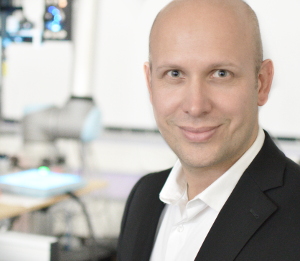Lightweight parts are widely used in aerospace and the automotive industry, but the inspection of such fiber composite components can turn out to be quite difficult.
PROFACTOR has developed sensor technology that allows automated quality inspection of glass or carbon fiber composites.
The technology can be used during different stages of the manufacturing process. Starting with the inspection of raw fiber material, the measurement of fiber orientation of the preform part and finally for quality control of the clear-coated part.
Fiber composite parts in the aerospace or automotive industry usually have a complex 3-dimensional shape. The fiber orientation on such parts is carefully designed to fit to the load cases.
Our inspection systems use illumination from different directions and they analyze image sequences to accurately calculate fiber orientations in 3D and to detect a wide range of typical defects. They are thus able to deal with the specific optical properties of glass or carbon fibers (dry, prepreg, or material with binder).
Our Sensor Solutions
Faserwinkelmessung bei Carbon- und Glasfasern (F-SCAN)
Inline-Kontrolle bei automatisierten Ablegeprozessen (L-SCAN)
Prüfung von Hochglanzoberflächen (D-SCAN)
Prüfung von strukturierten Oberflächen (T-SCAN)
Contribution to Zero Defect Manufacturing
Competition in modern manufacturing is defined by costs, flexibility, material shortages but also by a growing focus on sustainable processes and products. This means that for staying on top of the market, lowering defect rates is getting increasingly important for most companies. In short: Simply sorting out defective parts will no longer lead to success.
To successfully lower defect rates, manufacturing companies need to constantly learn from their output quality. Automated surface inspection based on machine vision plays an important role to close this feedback loop. Here sensors combined with machine learning are coping with a growing variability of both product designs and materials and are able to learn from human decisions making.
This is why our sensors use modern algorithms to gain a deep understanding of manufacturing quality for fiber composite parts and materials. This goes far beyond standard measurement techniques, forming the basis for elevating manufacturing to the next level.
Our inspection systems provide quality data which goes beyond simple good or bad decisions and hence support the path towards Zero Defect Manufacturing.


